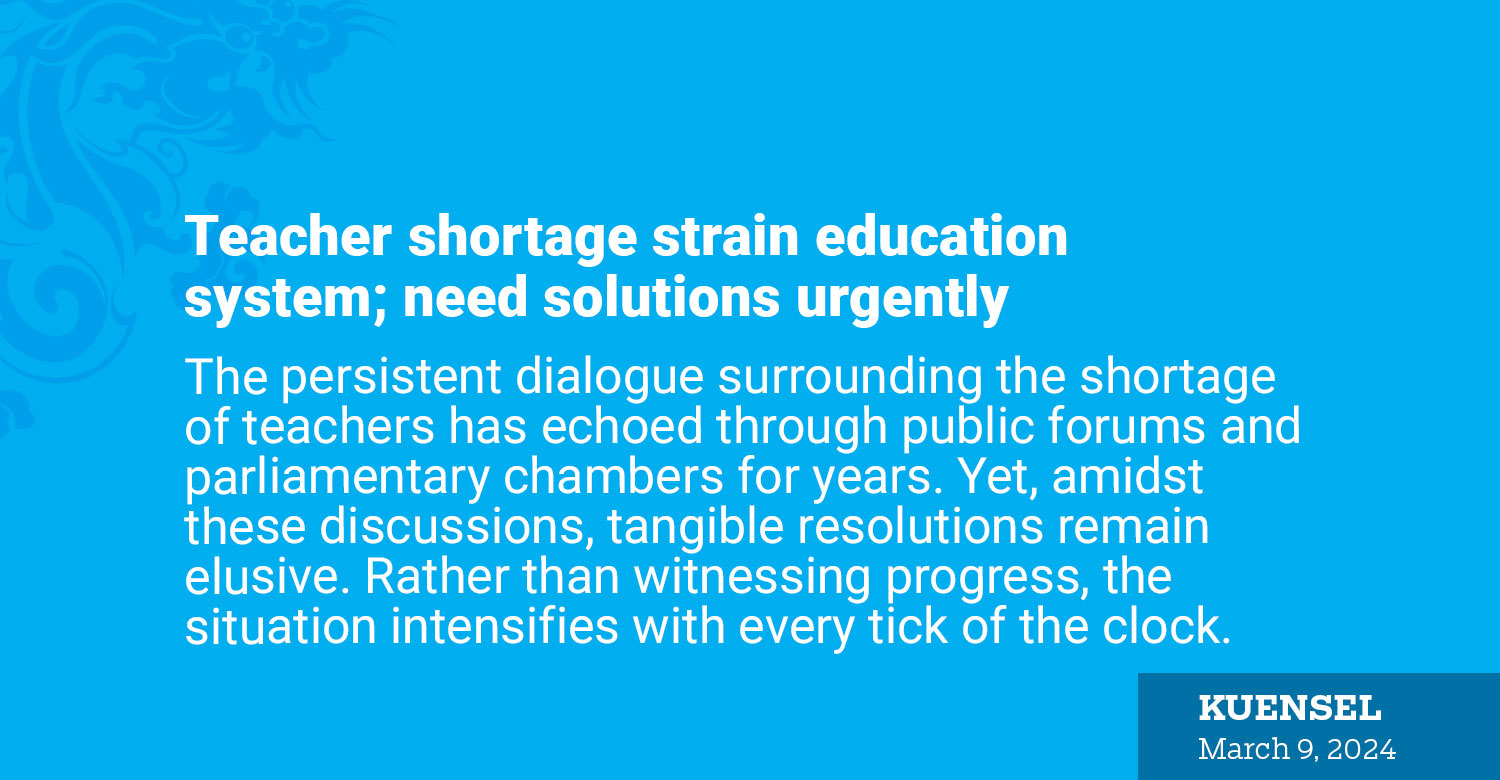KP Sharma
The persistent dialogue surrounding the shortage of teachers has echoed through public forums and parliamentary chambers for years. Yet, amidst these discussions, tangible resolutions remain elusive. Rather than witnessing progress, the situation intensifies with every tick of the clock.
This issue burdens teachers, pushing them to extend their teaching hours beyond the norm, leaving them overwhelmed and stretched thin.
The strain on teachers is evident as some are tasked with managing three to four levels of classes simultaneously. This heavy workload not only leads to fatigue but also fosters a suffocating atmosphere, amplifying the challenges they face.
Reports indicate that certain schools are grappling with the teacher shortage by integrating support staff, such as school counsellors, to aid in teaching lower grades.
This adaptation shows the tangible impact of the shortage, as schools resort to unconventional measures to manage the situation.
Further, to mitigate the effects of the shortage and uphold the continuity of classes, certain schools are depending on principals and teachers without specialised backgrounds or training in specific subjects to fill the teaching gaps.
This highlights the resourcefulness required to navigate the challenges posed by the shortage while maintaining the integrity of education delivery.
The Ministry of Education and Skill Development is proactively engaged in tackling this challenge, striving to guarantee the uninterrupted operation of schools.
However, despite concerted efforts, the issue persists, exacerbated by an increasing number of teachers exiting the system, outpacing the rate of new recruitments.
Last month, the ministry announced vacancies for the recruitment of regular contract teachers, supplementing the ongoing efforts to recruit National Contract Teachers (NCT).
The recruitment process for national contract teachers (NCTs) has undergone decentralisation, empowering dzongkhags under the previous government to expedite the recruitment process.
This transfer of authority empowers dzongkhags to autonomously recruit NCTs, tailoring the process to the unique staffing needs of individual schools. This shift fosters a more adaptable and streamlined approach, enhancing efficiency in addressing the teacher shortage.
As per the recently issued deployment plan for contract teacher recruitment by the ministry, approximately 600 vacancies for contract teachers have been announced.
The distribution of these vacancies encompasses various teaching roles, with general teachers constituting the highest recruitment at 304 slots, closely followed by science teachers with 65 slots.
However, Geography and Physics have the lowest number of slots available for recruitment.
Examining the distribution of vacancies across dzongkhags, Samtse has the highest number of slots with 60 teachers, closely trailed by Wangdue with 55 teachers. Gelephu and Lhuntse have been the least number of vacancies.
In line with the regular recruitment process, the ministry has introduced a novel initiative by inviting teachers who had previously resigned voluntarily or upon the expiry of their contracts to re-register if they desire to return to the profession.
Despite the registration deadline passing on February 28, the ministry is currently engaged in verifying the documents submitted. Consequently, it refrains from disclosing the precise number of returning teachers until this verification process is completed.
According to an officiating principal at one of the primary schools, the workload for teachers has become progressively demanding.
In addition to teaching more than 21 periods a week, teachers are also compelled to take on supplementary roles such as mess in charge, scout coordinator, disaster in charge, and health in charge due to the scarcity of staff.
This multifaceted responsibility significantly depletes teachers and takes a toll on their morale.
The officiating principal further said that the challenges arising from frequent policy changes, stating that new policies are often implemented without a comprehensive understanding of the practical realities on the ground.
These sudden shifts in policy exacerbate the already hectic nature of the job and contribute to the demoralisation of teachers.
A school counsellor argues that counsellors, who are trained in counselling and tasked with broader responsibilities, are being pressured to assume teaching duties, jeopardising their primary roles.
Many teachers have expressed concerns that expecting educators to multitask and shoulder excessive workloads could potentially lead to a decline in the quality of education in the country. They believe that overburdened staff are likely to become demotivated and consequently may struggle to deliver high-quality education due to the strain of additional tasks.
Addressing these concerns and cultivating a supportive environment for teachers already burdened with responsibilities is deemed crucial for ensuring the effectiveness and sustainability of the education system.
Furthermore, teachers suggest that B.Ed graduates, who are already trained educators, should be directly recruited by the government without the necessity for them to undergo the Royal Civil Service Commission (RCSC) examination process.
This streamlined approach could expedite the recruitment process and alleviate some of the challenges associated with teacher shortages, ultimately benefiting the education sector as a whole.


